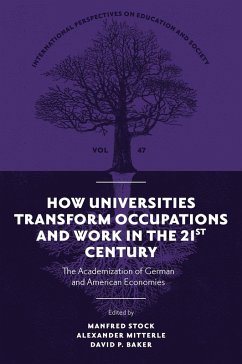Advanced education is often thought to respond to the demands of the economy. Market forces create new occupations, and then universities respond with degrees and curricula tailored to produce graduates with the required skills. Presented here is ground-breaking comparative research on an underappreciated, yet growing, concurrent alternative process: universities and their expanding research capacity create knowledge and skills, legitimated in new degrees that then become monetized and even required in private and public sectors of economies.With far reaching implications for understanding the educational transformation of capitalism and social inequality, the future of professionalization in occupations, persistent expansion of advanced education, and profound change in the culture of work in the 21st Century, the chapters explore sociological implications, possible global impacts, and critiques of the process. Detailed German and U.S. case studies of the university s origins and influence on workplace consequences of six selected occupations and degrees investigate the dimensions of the academization process. Demonstrating universal application, the cases contrast the more open and less-restrictive education and occupational credentialling system in the U.S. with the centralized and government-controlled system in Germany.This is a much-needed new perspective on the worn-out notions of overeducation, credentialism, professionalism, and supposed unresponsiveness of systems of higher education.
Dieser Download kann aus rechtlichen Gründen nur mit Rechnungsadresse in A, B, BG, CY, CZ, D, DK, EW, E, FIN, F, GR, HR, H, IRL, I, LT, L, LR, M, NL, PL, P, R, S, SLO, SK ausgeliefert werden.









